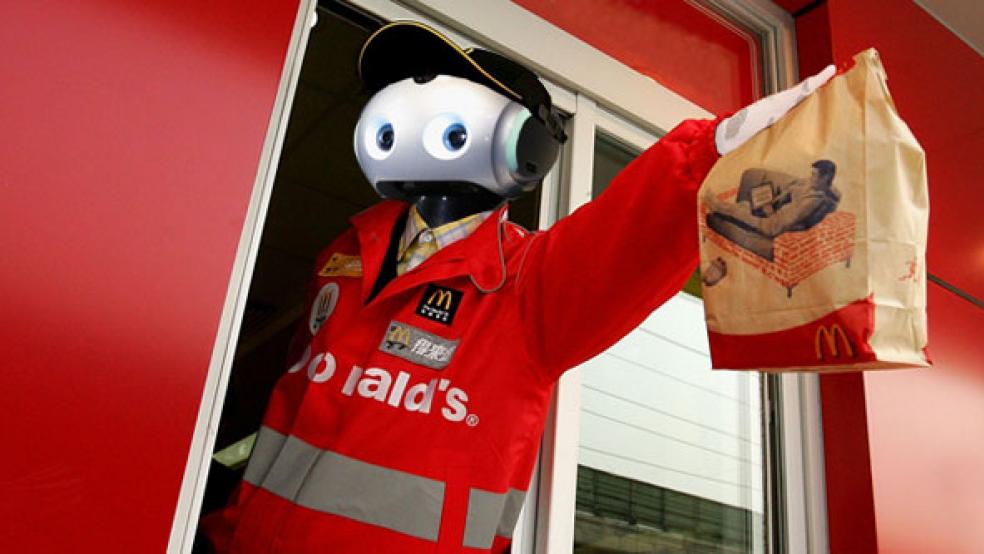Business Insider editor Henry Blodget is a smart guy with many great ideas, but using Walmart, McDonald's, and Starbucks as whipping boys for the decline of the middle class isn't one of them.![]()
Blodget argues that these large companies are getting rich on the backs of their employees by paying them poverty-level wages when they could pay more. Looking out across America from the ramparts of Manhattan's ivory towers, it may look like the peasants are laboring in the fields with children strapped to their backs, trying to scratch enough food from the land to keep themselves barely alive while planting and harvesting the crops that will go into the bulging granaries of the king and his nobles.
What you can't see because you're too far away to make out the details, is that most of those peasants are grateful they have a job, now that bad government policies, Wall Street manipulation, and global capitalism have made it so difficult to make things in America, sell them abroad, and share the profits with the hands that made them.
You can't see, because you're too far away, that millions of those workers are teens and young adults who experienced the thrill of receiving their first real paychecks from those companies, who are typically passing through on their way to other careers, doing what generations have done before, and whose earnings help underwrite their college educations, their first cars, their weddings and baby clothes, and, believe it or not, giving them the chance to develop working habits and skills that will one day serve them well as professionals, executives, and entrepreneurs.
I'm not defending the companies, but I am defending the facts and attacking the perception that it's somehow predatory in a capitalistic system for a private enterprise to pay wages that the market will bear, because the bad choices of others have made the market cheap.
When my peers were teenagers, we mowed lawns, washed cars, delivered newspapers, babysat, and did whatever we could to earn our spending money and fill our bellies while we went to college. A friend of mine who was in college went to the supermarket every Friday, bought ingredients for hero sandwiches, took them back to her dorm, and sold sandwiches each weekend to her starving fellow students to earn the money to pay for her textbooks.
Today, she might be pouring overpriced coffee at Starbucks, learning about how a tightly-run store operates, enjoying modest benefits like health insurance, learning teamwork, and having the satisfaction of knowing that a complete stranger values her time and is willing to pay her for it at a market-competitive rate.
Every year, McDonald's hires nearly a half million who will work a summer, a semester, a school year, to earn their gas, clothes, and recreation money so they don't have to ask Mom and Dad. For as long as they work there, they will be trained, they will learn what it means to be on time, arrive prepared, operate as part of a team, and if they stick around for two or so years, they can be promoted to shift manager and run a store with up to a dozen employees under their wings. How many businesses can you name that would give an 18-year-old that much leadership responsibility.
Great enterprises often begin modestly. What happens to these oppressed peasants after they leave? In the case of McDonald's, many become executives or go on to own franchises and become entrepreneurs. You might be surprised by the people who started at McDonald's and ended up in unlikely places: Jeff Bezos, who founded Amazon; Andrew H. Card, Jr., who was President George W. Bush's chief of staff; Leroy Chiao, who went on to become an astronaut; actress Andie MacDowell; Jay Leno, who credits his McDonald's boss in Andover, Massachusetts with encouraging him to enter a company talent show that proved to be the sparker that started his career.
Finally, I would argue that you've overlooked a global aspect: Walmart, McDonald's, and Starbucks are exporters of American culture. They harvest a portion of their profits overseas, profits that ultimately are reflected in the prices of their stocks, which are owned by American investors, among others, and in the case of McDonald's, have been returned to shareholders in the form of dividends paid and RAISED every year since 1976.
Like a fine painting, you often have to get up close to see all the tiny brush-strokes that made it so beautiful. I encourage you to cross the Hudson one of these days and see what's really happening in the vineyards and fields across America.
This piece was originally posted at The Business Insider
More Business Insider Links
- Obama Gives Another Sweetheart Deal to His Friends at GE
- Why Berkshire Hathaway Is At Its Lowest Valuation in Decades
- Here's One Example of Why Americans Don't Trust Financial Reform
- The Next Step for the Postal Service is Firing Up to 35,000 Workers
- Obama's Corporate Tax Plan Would Actually Create New Loopholes




